Manchester Arena Inquiry: Hearings begin into terror attack
Several people raised suspicions about the Manchester Arena suicide bomber in the minutes before he killed 22 people.
Salman Abedi was reported to police and security ahead of the attack but one witness felt he was "fobbed off", a public inquiry has heard.
The witness had approached Abedi and asked him what was in his backpack while another said he thought he saw the suicide bomber praying.
Hundreds were injured in the bombing at the end of an Ariana Grande concert.
Inquiry proceedings began with Paul Greaney QC, counsel to the hearing at Manchester Magistrates' Court, reading the names of the 22 people who died on 22 May 2017.
"What happened that night was the most devastating terrorist attack in the UK for many years," he said.
"The inquiry will leave no stone unturned."
'Establishing the truth'
Families, lawyers and chairman of the inquiry Sir John Saunders, a retired High Court judge, stood with heads bowed for a minute's silence before Mr Greaney's opening.
Sir John then formally opened the inquiry, adding "this is an exercise in establishing the truth".
"If I conclude things went wrong then I shall say so, but we are not looking for scapegoats. We are searching for the truth," he said.
"The explosion killed 22 people, including children, the youngest was eight years old.
"Salman Abedi blew himself up in the explosion but he intended as many people as possible would die with him."
The most sensitive evidence is likely to be heard at closed hearings, with both press and public excluded because of the risk to national security.
The public inquiry follows a trial in which a jury found Hashem Abedi guilty of helping his older sibling to plan the atrocity.
He was jailed for at least 55 years on 20 August for the 22 murders.
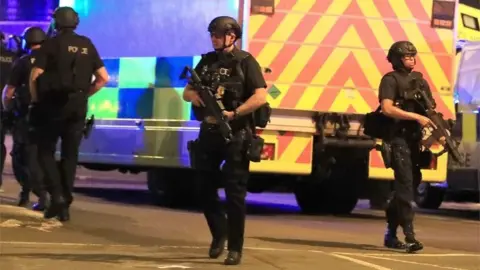 PA Media
PA MediaIn his opening statement, Mr Greaney told the inquiry "experts consider that on 22 May there were missed opportunities to identify Salman Abedi as a threat and take mitigating action".
While there is evidence that suspicions were raised by members of the public in the minutes before the attack, "no steward or British Transport Police (BTP) officer appear to have identified him as suspicious", the inquiry heard.
Mr Greaney said experts concluded: "If the presence of a potential suicide bomber had been reported, it is very likely that mitigating actions would've been taken that could have reduced the impact of the attack.
"This is because there was sufficient time between Abedi first being spotted by, and also reported to staff and his attack to effectively react."
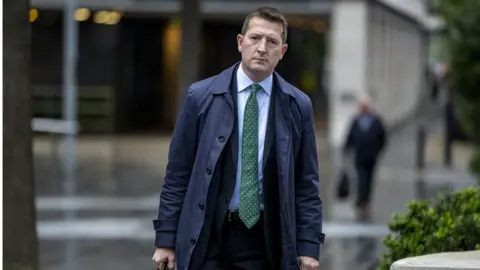 PA Media
PA MediaOne member of the public, William Drysdale, spotted Salman Abedi and thought he was praying, less than an hour before he detonated his bomb.
A second witness, Julie Merchant, approached BTP officer Jessica Bullough around 32 minutes before the deadly bombing to point out Abedi.
Mr Greaney said Ms Merchant cannot recall the details of the conversation with the officer but that it was "to do with praying and political correctness".
The officer cannot remember the conversation taking place, the hearing was told.
She was the first police officer to enter the City Rooms, where the bomb was detonated, after the attack, showing considerable bravery, Mr Greaney added.
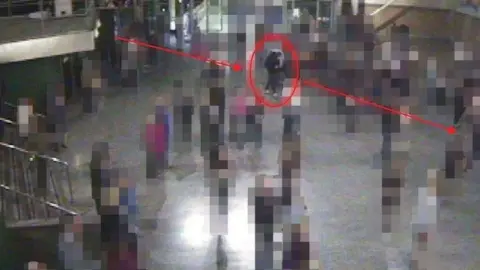 GMP
GMPTwo more witnesses, known only as A and B, also saw a man matching Salman Abedi's description acting suspiciously.
Mr A challenged Abedi, asking him what he had in his backpack.
The witness then spoke to a Mohammed Agha, an employee of Showsec which provided security to the Arena on behalf of the venue's owners SMG, at 22.14, some 17 minutes before the detonation but said he was "fobbed off."
Mr Agha spoke to colleague Kyle Lawler about the matter, eight minutes before the bomb went off.
But neither security control nor anyone else was informed about the suspicious activity, the hearing was told, although Mr Lawler said in a statement he tried to contact control but could not get through.
He then spotted the man get up and start walking towards the arena entrance.
His statement continued: "I just froze and did not get anything out on the radio. I knew at that point it was too late."
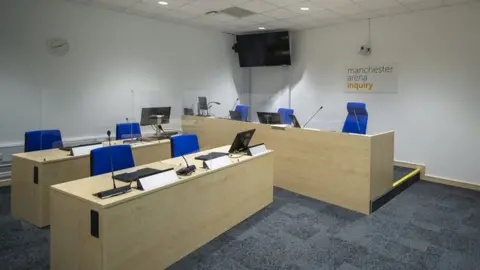 PA Media
PA MediaMr Greaney also said expert evidence would be heard about risk assessments at the Arena.
"There was no effective risk assessments that considered the threats from terrorism at Manchester Arena in early 2017, despite the severe threat level," he said.
The possible role of Salman Abedi's family in radicalising the suicide bomber and his brother needs to be assessed, the inquiry also heard.
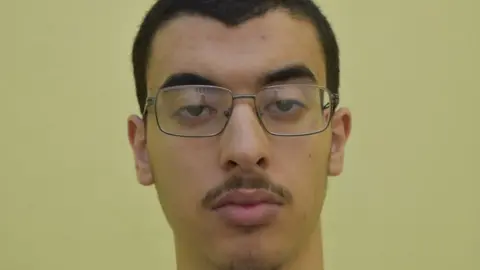 GMP
GMPMr Greaney told the inquiry: "Ismail Abedi, the brother of the killers, has been required by the inquiry legal team to answer a series of questions relating to what might, in general terms, be described as the issue of radicalisation.
"To date, he has declined to answer these questions on the basis that he maintains that his answers may tend to incriminate him."
He said similar requests to the brothers' parents, Ramadan and Samia, who are believed to be in Libya, "have not been responded to, at least not in any substantive way".
The chairman will make a report and recommendations once all the evidence has been heard by the inquiry, which is expected to take up to six months.

Why not follow BBC North West on Facebook, Twitter and Instagram? You can also send story ideas to [email protected]
